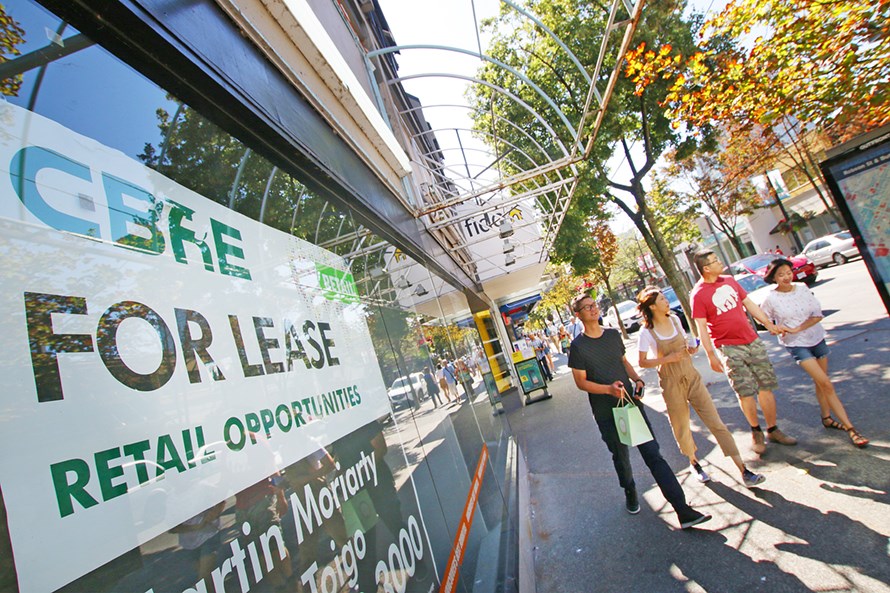While Metro Vancouverâs residential sector struggles, its commercial real estate market is holding firm, with vacancy rates extremely low, according to a monthly analysis by commercial market intelligence company CoStar Group.
The group analyzed the office, industrial and residential sectors and offered some forecasts on each market.
Office space
With minimum wages rising and unemployment low, office-based employment is expected to grow by 9.3 per cent in 2019, putting additional strain on the already overstretched office market in Metro Vancouver, according to CoStar.
The report said, âThe Metro Â鶹´«Ã½Ó³»office market continues to show signs of strength as the vacancy rate has continued to decline from 4.0 per cent at the beginning of 2019 to 3.0 per cent to close out the month of July. Strong net absorption levels of 2.5 million square feet over the past year have contributed to this decline, along with the lack of new office space coming to market as of late⦠Developers are actively working to alleviate this shortage as there are now 26 office projects totalling 4.9 million square feet currently under construction. With that being said, much of this new stock will not be delivered to the market until late 2021 and 2022. Additionally, many of the new flagship office projects that will be coming to market are heavily pre-leased, thus leaving prospective tenants with little options if they did not secure space well in advance.â
Any new buildings that are coming on stream are being snapped up in pre-leasing â but this does offer an opportunity to other office tenants struggling to find space.
Jamil Jamani, senior market analyst at CoStar, told Glacier Media, âOffice tenants are continuing to demand higher quality spaces and this has resulted in many new buildings coming to market to be heavily pre-leased. As many of these larger tenants move into their new higher quality spaces, there will likely be a upswing in vacancy in older buildings. This would be the optimal time for firms to secure larger space in the downtown core.â
The report added that the high demand in office space has pushed lease rates up. âWhile Metro Â鶹´«Ã½Ó³»waits for new supply to hit the market, average net asking rents have continued to increase, up 2.5 per cent year-over-year, to $24.04 per square foot in July 2019.â
Jamani added, âAlthough the office market is strong, we donât expect rents to grow as aggressively as they have, due to new supply coming to market within the next two years. Rent growth will likely return to more normal levels of two to four per cent per year.â
Industrial market
Space is even tighter in Metro Vancouverâs industrial market, said CoStar.
The report said, âThe industrial vacancy declined⦠to 1.6 per cent at the end of July 2019. Net absorptions levels have also increased over the past year reaching a whopping 5.8 million SF. In particular, the region faces extreme shortages of specialized industrial space as the vacancy rate in this segment is at a mere 0.7 per cent.â
Jamani told Glacier Media, âWe have started to see strata industrial units continue to play a greater role in the Lower Mainland, especially with rents growing at such a rapid rate over the past three years. Many industrial tenants are now starting to consider ownership as a viable option to control rent increases and avoid the possibility of eviction due to redevelopment.â
According to the report, âThe extremely tight market has caused net average asking rents to increase by 12.7 per cent year-over-year to $12.17 per square foot.â
Retail sector
Despite the strong showings of the office and industrial market, CoStar describes the retail sector as the âtrue gemâ of Metro Vancouverâs commercial real estate.
The report said, âMetro Vancouverâs true gem of the commercial real estate market belongs to the retail sector, as the overall vacancy rate has declined ⦠to a record low of 1.3 per cent at the end of July 2019. The surge of demand has been the result of international and luxury brands continuing to increase their presence in Metro Vancouver, and as a result, net absorption topped 2.1 million square feet.â
It added, âAverage net asking rental rates [for retail space] have been on an upward trend, growing by 13 per cent year-over-year to $34.44 per square foot. Retailers will now have to make more efficient use of spaces to overcome rising rental costs and continued upward pressure on wages.â
Jamani said, âMany small businesses have continued to face pressure due to rising property taxes as many of their leases are on a triple net basis, and as a result we continue to see many businesses that have been around for years close their doors. This combined with many older retail units being replaced with multi-family developments has also depleted older retail stock and have forced retailers to transition to newer but smaller units.â



